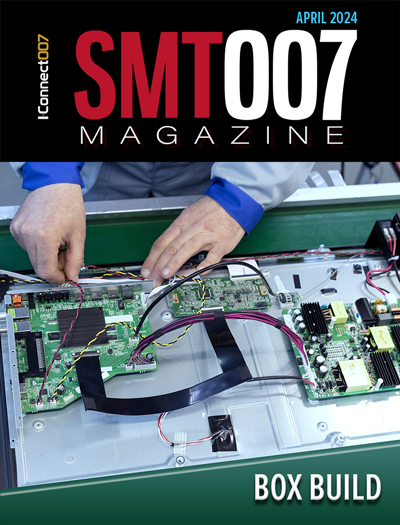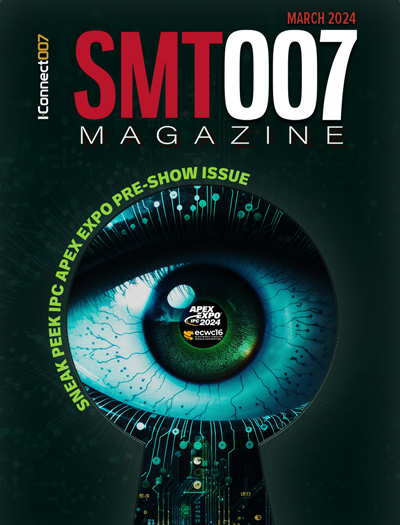-

- News
- Books
Featured Books
- smt007 Magazine
Latest Issues
Current Issue
Box Build
One trend is to add box build and final assembly to your product offering. In this issue, we explore the opportunities and risks of adding system assembly to your service portfolio.

IPC APEX EXPO 2024 Pre-show
This month’s issue devotes its pages to a comprehensive preview of the IPC APEX EXPO 2024 event. Whether your role is technical or business, if you're new-to-the-industry or seasoned veteran, you'll find value throughout this program.

Boost Your Sales
Every part of your business can be evaluated as a process, including your sales funnel. Optimizing your selling process requires a coordinated effort between marketing and sales. In this issue, industry experts in marketing and sales offer their best advice on how to boost your sales efforts.
- Articles
- Columns
Search Console
- Links
- Events
||| MENU - smt007 Magazine
Estimated reading time: 1 minute
DFARS Flow Downs and Trusted Suppliers
On May 6, 2014, the Department of Defense (DoD) issued Defense Federal Acquisition Regulation Supplement: Detection and Avoidance of Counterfeit Electronic Parts (DFARS Case 2012–D055); Final Rule. The purpose of this rule is to clarify the sections of the National Defense Authorization Act (NDAA) for 2012 and 2013, which deal with counterfeit parts. This supplement sought insight from industry that would allow the clarification of several key terms such as “trusted supplier” and “counterfeit part.” Additionally, this supplement addresses both the applicability of these clarifications and the role that existing industry standards play in assessing the trusted status of suppliers.
One of the main components of the DFARS is the clarification of two key definitions: “Counterfeit part” and “trusted supplier.” These two terms are both major components of NDAA Section 818, which among other things, requires the use of trusted suppliers to mitigate the proliferation of counterfeits. There was a very large industry response to requests for comment, which were put forward on these subjects. Ultimately, several key responses were given by the DoD to industry recommendations regarding the definition of “counterfeit part,” as follows:
- Due to concerns regarding the broad nature of the term “counterfeit part,” the term was determined to apply specifically to electronic components.
- An element of intent was added to the term “counterfeit part” by including the term “misrepresented.”
- All terms in the original definition referring to a part’s “substitute” were replaced with the term “unlawful substitute.”
The ultimate effect of these three changes is the fact that in order for a part to be considered counterfeit under DFARS, it must be substituted for a legitimate part with the intent of deceit. This eliminates the possibility that parts might be considered counterfeit as a result of manufacturing defects or improper handling.
The definition of the term “trusted supplier” is likely of even larger importance than what determines a counterfeit component. This is due to the fact that the idea of who is considered a trusted supplier is not only essential to DFARS, but also one of the main concepts put forth by NDAA Section 818: the use of “trusted suppliers” in the defense industry is now required by law.
Read the full column here.
Editor's Note: This column originally appeared in the July 2014 issue of SMT Magazine.
More Columns from Kramer on Counterfeits
A Summary of Counterfeit Avoidance: Development & ImpactKramer on Counterfeits: Bad Customers
Kramer on Counterfeits: Counterfeit Electronic Parts Avoidance - Profitability or Catastrophe
U.S. Military Tools to Prevent Counterfeit Electronics
Kramer on Counterfeits: DFARS Flow Downs and Trusted Suppliers
Kramer on Counterfeits: Testing Requirements for Components from Unauthorized Sources
Kramer on Components: Independent Distributor - Supply Chain's Best Friend or Worst Enemy?
Kramer on Counterfeits: Protecting Your Supply Chain from Counterfeits & Liability


